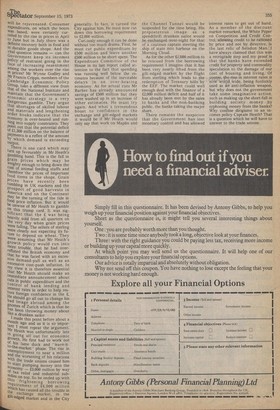c ,Tb4 opectator September 15, 1973
Will be rejuvenated. Consumer expenditures, on which the boom was based, were certainly curtailed by the rise in prices in April to June but in July there was a definite recovery both in food and in durable goods shops. And the vital question remains — can the Government keep its incomes
Polley of restraint going in the face of increasing resentment among the workers over the rise in prices? Mr Wynne Godley and Mr Francis Cripps, members of the Cambridge Economic Policy Group, take a different view from that of the National Institute and maintain that the Government's economic strategy is a very dangerous gamble. They argue that shortages of skilled labour and materials and lengthening Order books indicate that the economy is over-heated and running into supply constraints. They Pnint out that the potential deficit of £1,300 million on the balance of Payments is a reflex of the amount by which demand is exceeding output.
There is one card which may turn up favourably in Mr Heath's gambling hand. This is the fall in grain prices which may be Weighty enough to bring down the cost of animal feeding stuffs and therefore the prices of important food items in the shops. Grain prices have recently been tumbling in UK markets and the Prospect of good harvests in America and on the Continent may be the turning of the tide in
rood price inflation. But it would be unwise of Mr Heath to gamble Oh this trump card. It was significant that the £ was being
heavily, sold from all quarters on the very day when grain prices were falling. The sellers of sterling were clearly not expecting its future to depend on wheat. They were assuming that Mr Heath's growth policy would run into More trouble, that he had overreflated the British economy and that he was faced with an excessive demand-pull as well as an excessive cost-push inflation. In my view it is therefore essential that Mr Heath should make an
immediate announcement about cuts in public expenditure and the Control of bank lending and
interest rates in order to help restore foreign confidence in the £. He should go all out to change his bad image abroad among the gnomes of Zurich which is that he has been throwing money about like a drunken sailor. I made this point before about a month ago and as it is so important I must repeat the argument. Mr Heath was unfortunately late in going all out for economic growth. He first had to work out
of his lame duck and ' leave-itto-the-market ' phase. The rise in unernployment to near a million and the worsening of his relations With the trade unions caused him to start pumping money into the economy — £3,000 million by way
of tax relief and industrial subsidies on top. So he ended up with this frightening borrowing
requirement of £4,000 million Which has caused all the trouble in the exchange market, in the gilt-edged market and in the City
generally. In fact, it turned the City against him. He must now cut dawn this borrowing requirement to £2,000 million.
Curiously enough it can be done without too much drama. First, he must cut public expenditure by £500 million and leave another £500 million to be short spent. The Expenditure Committee of the House in its last report called attention to the fact that spending was running well below the estimates because of the inevitable delays in an over-heating economy. As for actual cuts Mr Barber has already announced savings of £500 million but they were washed up in an increase of other estimates. He must try again. And what a tremendous boast to confidence in the exchange and gilt-edged markets it would be if Mr Heath would only say that work on Maplin and the Channel Tunnel would be suspended for the time being. His preposterous image as a spendthrift drunken sailor would be °exchanged over-night for that of a cautious captain steering the ship of state into harbour on the Morning Cloud.
As for the other £1,000 million to be rescued from the borrowing requirement I imagine that it has been very nearly lifted from the gilt-edged market by the flight from sterling which leads to the redemption of Treasury bills by the EEF. The market could well enough deal with the finance of a £2,000 million deficit and half of it has already been met by the sales to banks and the non-banking public, the banks taking the major share.
There remains the suspicion that the Government has lost monetary control and has allowed interest rates to get out of hand. As a member of the discount market remarked, the White Paper on Competition and Credit Control, allowing credit to be rationed by price and not by directive, is the last relic of Selsdon Man. I have always claimed that this was a retrograde step and my proof is that the banks have extended credit for property and commodity speculation to the damage of our cost of housing and living. Of come, the rise in interest rates is nOV world wide, being foolishly .used as an anti-inflation weapon, but why does not the government take some imaginative action, such as making up the short-fall in building society money by syphoning money from the banks? Why confine dirigisme to an incomes policy Captain Heath? That is a question which he will have to answer to the trade unions.
































 Previous page
Previous page